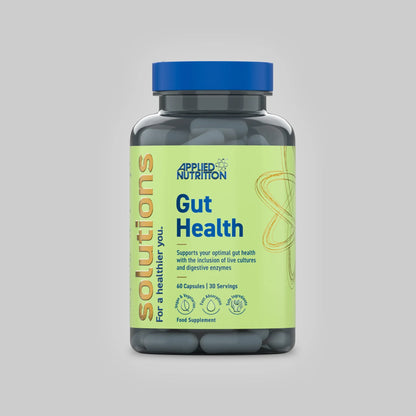gut balancing supplement FAQs: Everything Beginners Need to Know
Exploring the Causes and Manifestations of Intestine Issues and the Duty of Gut Wellness Supplement
Intestine health and wellness is an essential facet of total health. Poor dietary selections, stress and anxiety, and imbalances in digestive tract bacteria can bring about numerous gastrointestinal issues. Signs and symptoms such as bloating, looseness of the bowels, and abdominal discomfort frequently suggest deeper health concerns. Understanding these causes and the prospective function of intestine health supplements may provide crucial insights. What techniques can be used to bring back balance and boost gut feature? The solutions might exist in the following steps.
Recognizing the Intestine Microbiome
The gut microbiome, an intricate ecological community of trillions of bacteria living in the gastrointestinal system, plays a crucial role in overall health. This varied neighborhood contains bacteria, infections, fungis, and various other microorganisms that engage symbiotically with the human host. They assist in the food digestion of food, the synthesis of vitamins, and the guideline of metabolism. The intestine microbiome greatly affects the immune system, aiding to secure against pathogens and preserve a balanced inflammatory feedback. Research suggests that a healthy and balanced microbiome is essential for mental well-being, with gut-brain communications affecting mood and habits. Variables such as diet plan, way of life, and environmental direct exposures can shape the structure of the microbiome, stressing the significance of keeping a balanced diet plan rich in fiber and probiotics. Recognizing this elaborate ecosystem provides understandings right into exactly how intestine wellness can impact overall physical and mental wellness, highlighting its value in health and wellness monitoring.
Typical Reasons For Gastrointestinal Concerns
Although several variables can contribute to digestive system concerns, certain common causes often interrupt digestive tract wellness. Poor dietary options, such as high sugar and processed food intake, can result in imbalances in digestive tract germs. Furthermore, poor fiber consumption can impede food digestion and advertise irregularity. Anxiety is an additional substantial variable, as it can alter gut function and aggravate present conditions. Moreover, absence of exercise may slow down the digestion system, creating pain and bloating.
Infections, including microbial, viral, or parasitic agents, can additionally set off gastrointestinal disruptions. Food allergic reactions and intolerances, specifically to gluten and lactose, generally lead to gastrointestinal pain. Ultimately, the misuse of prescription antibiotics can interfere with the natural microbiome, bring about additional difficulties. Recognizing these usual reasons is vital for individuals looking for to improve their intestine wellness and general wellness.
Identifying Signs of Intestine Problems
Determining symptoms of intestine issues can be vital for timely intervention and boosted wellness. Individuals experiencing intestinal pain should recognize a number of common signs that suggest underlying problems. Signs and symptoms might include bloating, gas, diarrhea, constipation, and abdominal pain. These symptoms can vary in intensity and frequency, frequently showing the extent of the digestive tract trouble. Additionally, some individuals may observe unplanned weight loss, tiredness, or adjustments in hunger, which might signal a more serious condition. Skin issues, such as breakouts or acne, may additionally emerge, connecting intestine wellness to overall wellness. Importantly, relentless signs need to not be disregarded, as very early recognition can facilitate efficient treatment and avoid further problems. A thorough understanding of one's bodily signals is necessary, enabling individuals to seek clinical advice when essential and potentially leading to much better wellness outcomes with appropriate interventions.
The Influence of Diet Plan on Gut Health
Diet plays a vital role in determining gut health and wellness, influencing both microbial balance and digestive system performance. Nutrient-rich foods can promote a healthy intestine environment, while processed foods might lead to imbalances and digestive problems. Recognizing these nutritional impacts is vital for keeping total gut health and wellness.
Nutrient-Rich Foods
While numerous factors affect intestine health and wellness, the duty of nutrient-rich foods can not be overemphasized. A diet abundant in whole foods, such as fruits, veggies, entire grains, lean proteins, and healthy fats, contributes greatly to keeping a well balanced intestine microbiome. These foods offer important vitamins, minerals, and antioxidants that support digestive system health and decrease swelling. Fiber-rich choices, specifically, promote routine bowel activities and nurture helpful intestine bacteria, boosting general digestive tract function. Probiotic-rich foods like yogurt and fermented veggies even more support gut plants, assisting digestion. Integrating a range of nutrient-dense foods not just fosters a healthy digestive tract atmosphere however likewise enhances the immune system, adding to total health. Focusing on these foods can bring about enhanced intestine wellness and avoid possible her latest blog issues.
Processed Food Consequences
The intake of processed foods can considerably weaken here are the findings digestive tract wellness, combating the benefits of nutrient-rich choices. These foods are commonly high in chemicals, ingredients, and sugars, which can interrupt the equilibrium of digestive tract microbiota. A diet regimen abundant in processed products has a tendency to lack necessary nutrients, leading to deficiencies that endanger digestive feature. Furthermore, too much sugar and undesirable fats can promote swelling and add to conditions like irritable digestive tract syndrome (IBS) and leaky gut disorder (supplement for bloating). This inequality may cause signs and symptoms such as discomfort, bloating, and gas. In addition, the low fiber web content in processed foods decreases gastrointestinal health by restricting the development of advantageous germs. Inevitably, a shift towards whole, unprocessed foods is essential for keeping suitable intestine feature and overall health
Exactly How Tension Impacts Digestion
Tension considerably influences digestion by causing a waterfall of physiological responses that can disrupt regular gastrointestinal feature. When a specific experiences tension, the body gets in a fight-or-flight mode, launching hormones such as cortisol and adrenaline. These hormonal agents can slow down digestion by reducing blood circulation to the digestive system organs, resulting in signs and symptoms such as looseness of the bowels, constipation, or bloating.
In addition, anxiety can alter the intestine microbiome, negatively influencing the balance of valuable germs. This discrepancy can worsen existing digestive tract issues or produce new ones. Additionally, anxiety usually brings about unhealthy eating practices, such as over-eating or consuming refined foods, which can additionally jeopardize digestion wellness.
Psychological factors, such as stress and anxiety and anxiety, can also add to gastrointestinal pain, creating a feedback loop that perpetuates gut concerns. Comprehending the intricate partnership in between stress and anxiety and food digestion is necessary for preserving general gut wellness.
The Duty of Intestine Wellness Supplements
Intestine wellness supplements play a considerable duty in improving gastrointestinal function and total wellness. Secret ingredients, such as prebiotics and probiotics, are necessary for maintaining a balanced intestine microbiome. Understanding the benefits and elements of these supplements can assist individuals in making educated selections for their digestive health.
Advantages of Intestine Supplements
A growing gastrointestinal system is critical for total health, and digestive tract wellness supplements can play a significant duty in attaining this balance. These supplements commonly contain probiotics, prebiotics, and various nutrients that sustain digestive function and promote a healthy intestine microbiome. By boosting the growth of valuable germs, they can improve food digestion, decrease bloating, and that site ease pain connected with intestinal concerns. Furthermore, intestine supplements might enhance the digestive tract barrier, possibly minimizing the threat of food level of sensitivities and inflammatory problems. Normal use can likewise add to improved nutrient absorption, energy levels, and also mental well-being, as gut wellness is carefully connected to state of mind guideline. Inevitably, integrating gut health supplements can be a critical method to maintaining digestion harmony and total health.

Secret Active Ingredients to Consider
When choosing digestive tract health and wellness supplements, recognizing the vital ingredients is important for optimizing their advantages. Probiotics, particularly Lactobacillus and Bifidobacterium pressures, are vital as they help recover a balanced digestive tract microbiome. Prebiotics, such as inulin and fructooligosaccharides, serve as food for these useful bacteria, promoting their development. Digestion enzymes, including amylase and protease, help in breaking down food, enhancing nutrient absorption. Additionally, fiber resources like psyllium husk assistance routine bowel movements and general intestine wellness. Various other valuable ingredients might include L-glutamine, which assists in fixing gut cellular lining, and zinc, known for its immune-supporting buildings. Choosing supplements with these key parts can significantly boost gut health and overall health.
Tips for Keeping a Healthy Gut
Preserving a healthy gut is vital for general wellness, as it plays an essential role in food digestion, immunity, and nutrient absorption. To sustain intestine health, people need to focus on a well balanced diet regimen abundant in fiber from fruits, vegetables, and whole grains. These foods promote helpful microorganisms in the intestine. Furthermore, including fermented foods such as sauerkraut, kefir, and yogurt can improve intestine plants variety. Staying hydrated is likewise vital, as sufficient water intake aids digestion and nutrient transportation.
Routine physical activity adds to digestive tract wellness by advertising reliable food digestion and reducing stress, which can negatively influence intestine feature. Taking care of anxiety with mindfulness techniques like reflection or yoga can also sustain gut wellness. Lastly, avoiding too much use of prescription antibiotics and restricting refined foods, sugars, and harmful fats can promote a well balanced gut atmosphere. By taking on these practices, people can significantly boost their gut health and wellness and overall wellness.
Regularly Asked Questions

Can Digestive Tract Wellness Influence Mental Wellness and Mood Stability?
Study shows a significant link between gut health and psychological health. The intestine microbiome can influence mood security and mental health, recommending that maintaining a healthy digestive tract may add positively to psychological durability and cognitive function.
Exist Details Foods to Prevent for Better Gut Health?
Particular foods can adversely impact intestine wellness, consisting of processed sugars, sweetening agents, and high-fat milk items. Minimizing these products may boost digestive feature and promote a much healthier intestine microbiome, bring about generally much better health.
For how long Does It Take for Digestive Tract Health Supplements to Program Consequences?
The duration for intestine wellness supplements to demonstrate effects differs amongst individuals. Normally, obvious modifications might take place within a couple of weeks, yet some individuals might call for numerous months for perfect results, relying on their one-of-a-kind wellness problems.
Can Kid Experience Intestine Concerns Similar to Grownups?

Children can experience gut problems similar to grownups, consisting of pain, bloating, and uneven defecation (supplement for bloating). Variables such as diet plan, anxiety, and infections may add to these troubles, making awareness and administration essential for their wellness
What Are the Long-Term Results of Unattended Intestine Problems?

Fiber-rich alternatives, particularly, promote routine digestive tract activities and nurture beneficial gut microorganisms, boosting total gut function. A flourishing digestive system is important for general health and wellness, and intestine wellness supplements can play a substantial duty in attaining this equilibrium. In addition, gut supplements may reinforce the digestive tract obstacle, possibly decreasing the risk of food sensitivities and inflammatory conditions (supplement for bloating). Regular physical activity adds to gut health and wellness by promoting reliable digestion and reducing anxiety, which can adversely influence gut feature. Specific foods can adversely affect intestine health, consisting of refined sugars, synthetic sugar, and high-fat dairy items